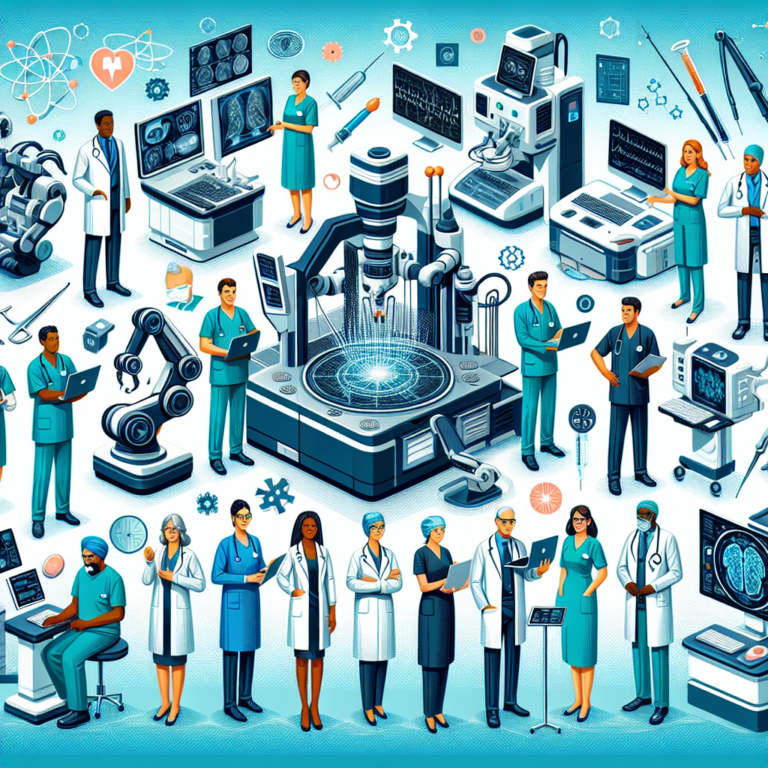In the rapidly evolving landscape of the 21st century, the field of medicine stands at the forefront of technological innovation and groundbreaking discoveries. As medical technology continues to advance at an unprecedented pace, it is transforming healthcare practices and outcomes in ways previously thought impossible. From cutting-edge diagnostic tools to revolutionary treatment options, these innovations are reshaping how we understand and approach patient care. This article delves into the heart of these developments, exploring the latest medical breakthroughs and their profound impact on modern healthcare. In the section “Innovations in Medical Technology: Transforming Healthcare in the 21st Century,” we examine the pivotal role of technology in revolutionizing medical practices. Meanwhile, “Understanding Medical Breakthroughs: A Guide to Recent Advancements” offers insights into the most significant advancements that are redefining the medical landscape. Join us as we navigate the exciting world of medical innovation, where science fiction becomes reality, and the future of healthcare is reimagined.
1. “Innovations in Medical Technology: Transforming Healthcare in the 21st Century”
In the 21st century, innovations in medical technology have significantly transformed healthcare, enhancing the quality of patient care and improving outcomes. As we continue to advance, these breakthroughs are reshaping the medical landscape, offering new possibilities for diagnosis, treatment, and disease prevention.
One of the most impactful innovations is the rise of telemedicine, which has revolutionized how patients access healthcare services. Telemedicine allows for remote consultations, making medical expertise accessible to individuals in even the most remote areas. This technology not only increases accessibility but also reduces the burden on healthcare facilities, ensuring that medical professionals can focus their efforts where they are most needed.
Moreover, wearable health technologies have become increasingly prevalent, enabling continuous monitoring of vital signs such as heart rate, blood pressure, and glucose levels. These devices empower patients to take control of their health, providing real-time data that can be shared with healthcare providers to make informed medical decisions.
Artificial intelligence (AI) is another frontier where medical innovations are making waves. AI algorithms are being used to analyze vast amounts of data to identify patterns and predict patient outcomes. This capability is particularly valuable in fields such as radiology, where AI can assist in detecting abnormalities in medical imaging, thus aiding in early diagnosis and treatment.
Additionally, advancements in precision medicine are paving the way for personalized treatment plans tailored to individual genetic profiles. This approach ensures that patients receive the most effective therapies with minimal side effects, enhancing the overall efficacy of medical interventions.
Robotics is also playing a crucial role, with robotic-assisted surgeries becoming more common. These systems offer enhanced precision and control, leading to quicker recovery times and less invasive procedures. The integration of robotics in surgery exemplifies how medical technology can improve surgical outcomes and patient safety.
Lastly, the development of novel medical devices and biotechnology solutions continues to push the boundaries of what is possible in the medical field. From 3D printing of prosthetics and organs to breakthroughs in gene editing technologies like CRISPR, the potential for innovation in medical technology is boundless.
 Also Read:
Women’s Mental Health: A Guide to Managing Stress &...
Also Read:
Women’s Mental Health: A Guide to Managing Stress &...
In conclusion, the 21st century is witnessing rapid advancements in medical technology that are transforming healthcare as we know it. By embracing these innovations, the medical community can continue to improve patient care, enhance treatment outcomes, and ultimately, save lives.
2. “Understanding Medical Breakthroughs: A Guide to Recent Advancements”
In recent years, the field of medicine has witnessed a surge of groundbreaking advancements that have significantly enhanced patient care and treatment outcomes. Understanding these medical breakthroughs is crucial for healthcare professionals, patients, and the general public alike. By keeping abreast of these developments, individuals can make informed decisions about their health and well-being.
One of the most notable recent advancements is the progress in personalized medicine. This approach tailors medical treatments to individual patients based on their genetic makeup, lifestyle, and environmental factors. By leveraging genomic data, healthcare providers can predict how patients will respond to specific treatments, thereby increasing the efficacy of interventions and minimizing adverse effects. Personalized medicine is transforming the landscape of medical practice, making treatments more efficient and patient-centered.
Another significant breakthrough is the development of immunotherapy for cancer treatment. Unlike traditional chemotherapy, which targets cancer cells directly, immunotherapy harnesses the body’s immune system to recognize and combat cancer cells. This innovative approach has shown promising results in treating various types of cancer, offering new hope to patients who previously had limited options.
Advancements in medical technology have also played a pivotal role in recent breakthroughs. The integration of artificial intelligence (AI) in diagnostics and treatment planning is revolutionizing the way healthcare is delivered. AI algorithms can analyze vast amounts of data with remarkable accuracy, assisting doctors in early detection of diseases and formulation of precise treatment plans. This not only improves patient outcomes but also optimizes healthcare resources, making it a cost-effective solution for medical institutions.
Moreover, the rapid development of telemedicine has made healthcare more accessible, especially in remote and underserved areas. With the aid of digital platforms, patients can consult with medical professionals from the comfort of their homes, ensuring continuity of care and reducing the burden on traditional healthcare facilities.
In summary, understanding medical breakthroughs and their implications is vital in navigating the ever-evolving landscape of healthcare. These advancements not only promise better health outcomes but also pave the way for a more personalized and efficient medical future. By embracing these innovations, we are taking significant strides towards a healthier world.
